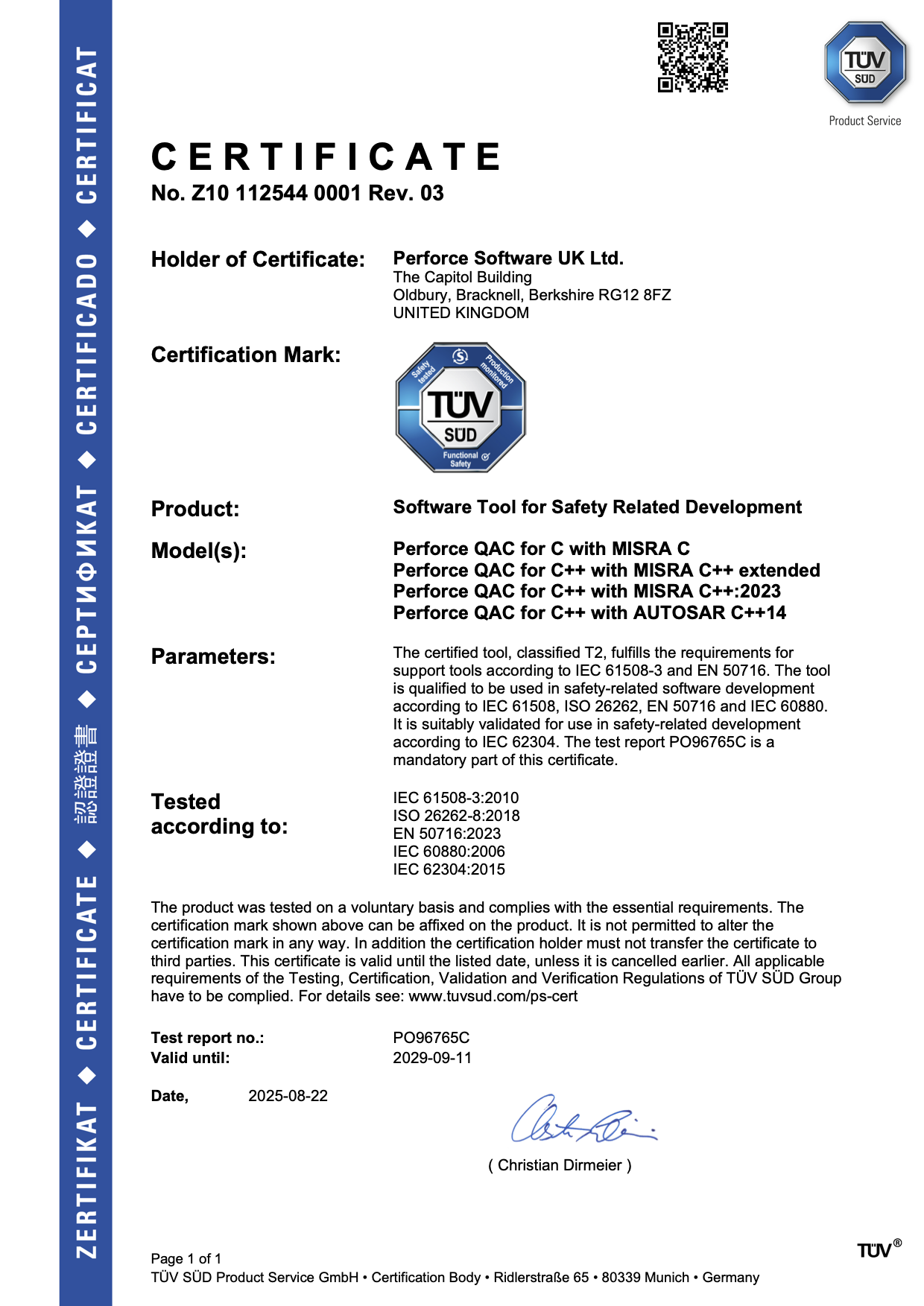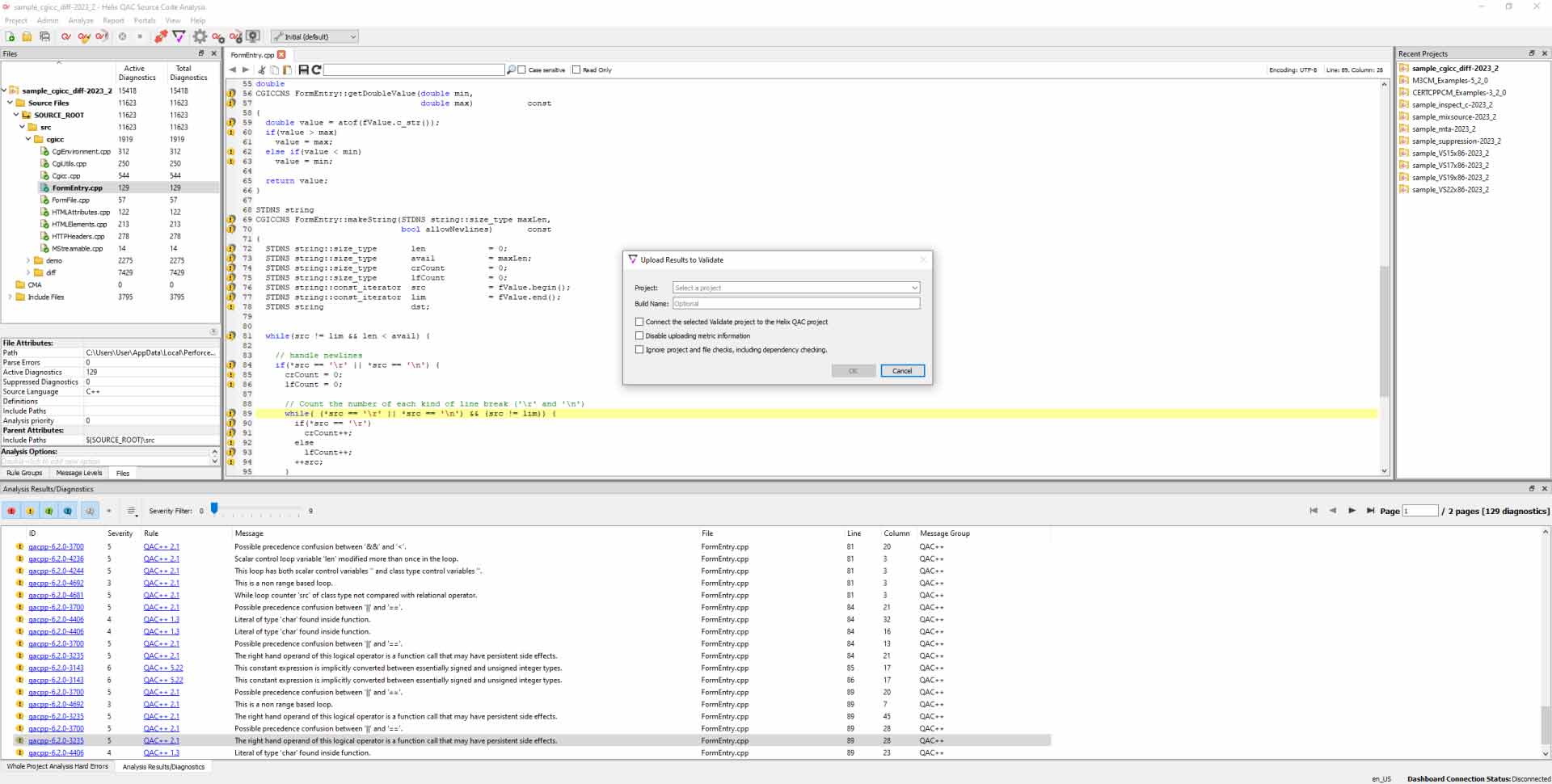Best Static Code Analyzer for Automotive Functional Safety and Standards Compliance
With its depth and accuracy of analysis, Perforce QAC has been the preferred static code analyzer in tightly regulated and safety-critical industries that need to meet rigorous compliance requirements. Often, this involves verifying compliance with coding standards — such as MISRA and AUTOSAR — and functional safety standards, such as ISO 26262. Perforce QAC is certified for functional safety compliance by TÜV-SÜD, including IEC 61508, ISO 26262, EN 50716, and IEC 62304. In addition, it is also certified in ISO 9001 | TickIT plus Foundation Level, which is one of the most widely adopted standards to ensure that your requirements are not only met but exceeded as well. Trust Perforce QAC as the best static code analyzer for C and C++.
“We’re impressed by the performance of Perforce QAC. It is very accurate. It finds issues that other tools have missed.”
Perforce QAC Coding Standards
Perforce QAC makes it easy to comply with coding standards. You can use the following compliance taxonomies to enforce coding standards across your codebase. And, you’ll get fewer false positives and false negatives in your diagnostics.
Safety Standards
-
Standard
C
C++
-
-
Safety standards help to ensure that the software powered by your code is reliable and functionally safe.
MISRA C: 2004
-
MISRA C:2012 (All Amendments)
-
MISRA C:2023
-
MISRA C:2025
-
Barr-C
-
MISRA C++:2008
-
MISRA C++:2023
-
AUTOSAR C++14
-
JSF AV C++
Security Standards
-
Standard
C
C++
-
-
Secure coding standards help to safeguard your code from potential cyberthreats and other coding vulnerabilities.
CERT
-
CWE
-
CWE Top 25
-
ISO/IEC TS 17961 (C Secure)
Quality Standards
-
Standard
C
C++
-
-
Quality standards help to ensure that your code is reliable and free of errors.
High Integrity C++ (HIC++)
Custom Standards & Compliance Modules
-
Standard
C
C++
-
-
You can create and customize your own rules, project/business coding standards, or compliance modules for C and C++.
Create Your Own Standard
-
Create Your Own Rules
-
Custom Compliance Module
Perforce QAC Is Certified for ISO, IEC, and EN Compliance
Perforce QAC is independently certified for compliance. Perforce QAC was developed by Programming Research/PRQA, which is now part of Perforce.
TÜV-SÜD Certified
Perforce QAC is TÜV-SÜD certified for compliance with key functional safety standards:
- ISO 26262 (automotive) up to ASIL level D.
- IEC 61508 (general industrial) up to SIL 4.
- EN 50716 (railways) up to SW-SIL 4.
- IEC 62304 (medical devices) up to Software Safety Class C.
- IEC 60880 (nuclear power).
ISO 9001 Certified
Perforce QAC is also certified in ISO 9001
ISO 9001 is one of the most widely adopted standards. It ensures that organizations are striving to meet and exceed customers’ requirements and satisfaction through continuous improvement.
ISO 27001 Certified
Perforce QAC is also certified in ISO 27001
ISO 27001 gives specific requirements that an organization must meet in order to be certified by an accredited certification body following the successful completion of an audit.

QAC Professional Services: Onboarding Packages
When you purchase Perforce QAC, we bundle an onboarding package to ensure a successful experience.
Learn More
Try it Free
Request your free 7-day trial of Perforce QAC.
See QAC Live
Start with your custom demo, or access our on‑demand QAC demo to get an immediate look QAC's features.
Get a Demo

